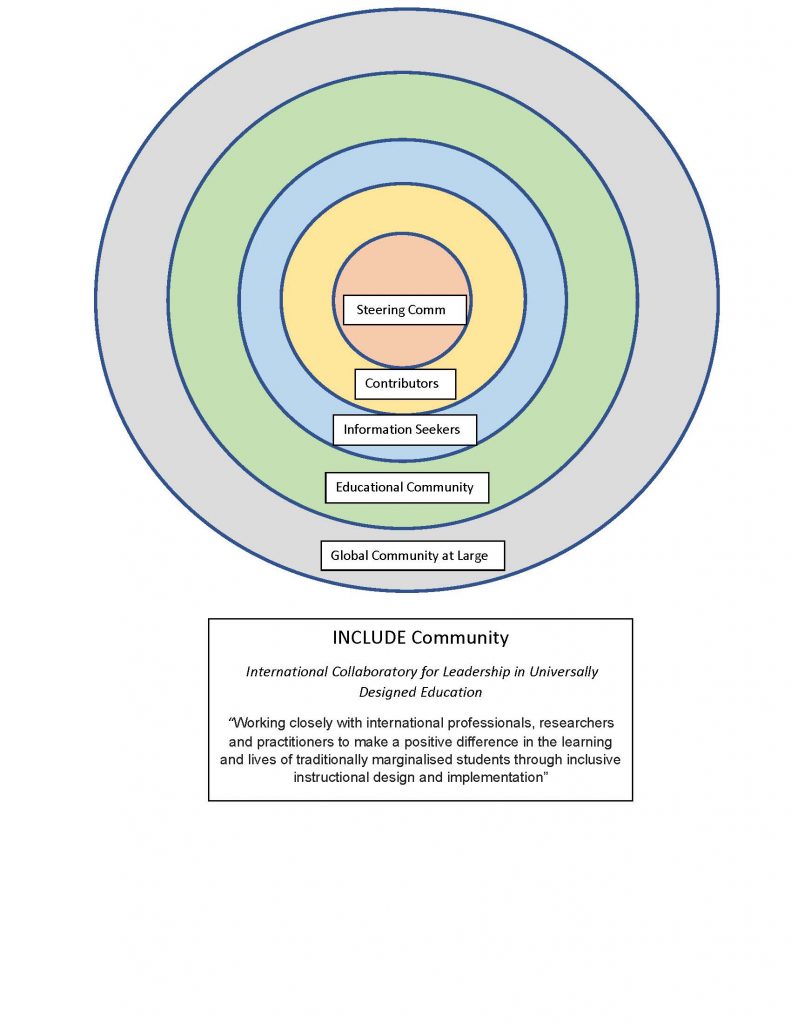About Include
What is a Collaboratory? (from Wikipedia, a free encyclopedia)
A collaboratory, as defined by William Wulf in 1989, is a “center without walls, in which the nation’s researchers can perform their research without regard to physical location, interacting with colleagues, accessing instrumentation, sharing data and computational resources, [and] accessing information in digital libraries” (Wulf, 1989). However, a wide-ranging definition is provided by Cogburn (2003, P. 86) who states that:
“a collaboratory is more than an elaborate collection of information and communications technologies; it is a new networked organizational form that also includes social processes; collaboration techniques; formal and informal communication; and agreement on norms, principles, values, and rules”.
What is the INCLUDE Collaboratory?
While a number of various collaboratories exist within the world of research, the INCLUDE Collaboratory is the first of its kind in the field of education. INCLUDE will focus on the idea of inclusive education around the world, establishing a center without walls where educators, professionals, learners, and researchers will communicate, share, and research together – all with an eye on how the concept of inclusive education can be effectively realized in educational venues around the world – ranging from higher education to k-12 education and beyond. Through the use of digital resources, the INCLUDE collaboratory will serve as a “greenhouse” for growing current and future ideas and for sharing knowledge, research, and resources to build equitable and inclusive educational opportunities and environments around the world.
INCLUDE is a central information and research hub hosted at the University of Worcester, UK, working in collaboration with higher education and other educational professionals, students, and stakeholders around the world to support increased understanding and effective implementation of inclusive education and Universal Design for Learning for all. The INCLUDE website will showcase insights from practice, build professional networks, and disseminate ongoing INCLUDE activities.
Universal Design for Learning (UDL) has its genesis in the United States at Harvard University and later through leadership preparation at Boston College. From work at CAST begun in mid -1980s, a new conceptual framework emerged that shifted attention away from learner deficits and disadvantages to the affordances potentially available in learning environments. Since its inception, UDL has gain an international reach, especially in the Higher Education sector, to envision ways in which students’ environmental and pedagogical experiences could become more accessible and inclusive.
In order to advance the imperative for developing a more educationally inclusive experience, the International Collaboratory for Leadership in Universally Designed Education (INCLUDE) will work closely with international professionals, researchers and practitioners who are committed to making a positive difference in the learning and lives of traditionally marginalised students.
The University of Worcester is increasingly recognised as a leader in the field of inclusive educational practices. In collaboration with other universities and educational professionals around the world, INCLUDE builds on current strong institutional principles and practices, providing an ambitious but achievable goal to ensure that students’ learning and social experiences become increasingly inclusive worldwide.
(text developed in part from INCLUDE Concept Paper, 2019)
Click here to read about INCLUDE’s Aims ……
Read about INCLUDE’s Action-Oriented Values …….
The focus of INCLUDE
Disabilities
Culture
Language
DIVERSITY
Abilities
Ethnicities
Nationalities
The INCLUDE Collaboratory Structure
